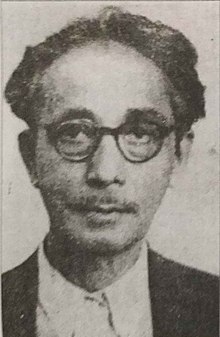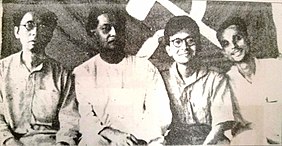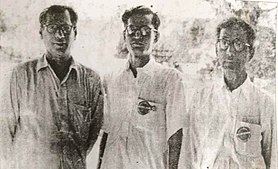This is an old revision of this page, as edited by The First Legionnaire (talk | contribs) at 13:49, 3 August 2024. The present address (URL) is a permanent link to this revision, which may differ significantly from the current revision.
Revision as of 13:49, 3 August 2024 by The First Legionnaire (talk | contribs)(diff) ← Previous revision | Latest revision (diff) | Newer revision → (diff) Indian politician For other people with similar names, see Muzaffar Ahmed (disambiguation).
| Muzaffar Ahmad | |
|---|---|
 | |
| Born | (1889-08-05)5 August 1889 Sandwip, Chittagong District, Bengal Presidency, British India (current day Bangladesh) |
| Died | 18 December 1973(1973-12-18) (aged 84) Calcutta, West Bengal, India |
| Nationality | Indian |
| Other names | Kakababu |
| Political party | Communist Party of India (Marxist) |
Muzaffar Ahmad (known as Kakababu; 5 August 1889 – 18 December 1973) was an Indian-Bengali politician, journalist and a co-founder of the Communist Party of India.
Background
Ahmed was born on 5 August 1889 at Musapur village on Sandwip Island in Chittagong District of Bengal Province in the-then British India (in present-day Bangladesh) to Mansur Ali. Ahmed received his early education on Sandwip. He passed matriculation from Noakhali Zilla School in 1913. He studied at Hooghly Mohsin College and then Bangabasi College, but was unsuccessful in the Intermediate in Arts examination and left college.
Career
He participated in political meetings and demonstrations starting in 1916. In 1918, he was appointed assistant secretary of the literary society Bangio Musalman Sahitya Samiti and took responsibility for producing its monthly journal. In 1920, along with Kazi Nazrul Islam, he started a new magazine, Nabajug. Later, when another magazine, Dhumketu was launched by Nazrul in 1922, he contributed to it using the pseudonym "Dwaipayana".
Ahmed was one of the founders of the Communist Party of India. In 1922, the Bharat Samyatantra Samiti was formed in Calcutta with Ahmed as its secretary. In 1924, he was sentenced to four years in prison because of his role in the Kanpur Bolshevik Conspiracy Case along with S.A. Dange, Nalini Gupta and Shaukat Usmani. He was released due to illness in 1925. In November, 1925 he, along with Kazi Nazrul Islam, Hemanta Kumar Sarkar, and others, organized the Labour Swaraj Party in Bengal. He was one of the main leaders of CPI in the early 1920s along with Abdul Halim and Abdur Rezzak Khan.


On 20 March 1929, the British colonial government arrested 31 labour activists and sent them to Meerut for trial. Ahmed was the chief accused, along with S.A. Dange, Shaukat Usmani, P.C. Joshi and others, was convicted in this so-called Meerut Conspiracy Case. He was released in 1936. He had served the longest term in jail as the chief accused in the Meerut trial.

After the partition of India in 1947, Ahmed moved to Kolkata rather than staying in East Pakistan (now Bangladesh). On 25 March 1948, the Communist Party of India was banned by the government of India and Ahmed was imprisoned. He was released from prison in 1951. He was again arrested and incarcerated for two years in 1962, and another time for two years in 1965. He was imprisoned several times in post-Independence India by the Congress government.
Personal life
Ahmed had a daughter, Nargis. She was married to the poet Abdul Quadir.
Legacy
- Co-founder of the Communist Party of India, 26 December 1925.
- Founder of the National Book Agency, 26 June 1939.
- The headquarters of the Communist Party of India (Marxist) in West Bengal is named after him.
- Ripon Street, a thoroughfare in Kolkata, was renamed "Muzaffar Ahmad Street".
Selected works
- Qazi Nazrul Islam: Smritikatha (in Bengali).
- Amar Jiban O Bharater Communist Party (in Bengali).
- Krishak Samasya (in Bengali)
- Prabase Bharater Communist Party Gathan (in Bengali)
- Bharater Communist Party Gorar Pratham Jug (in Bengali)
- Nirbachita Prabandha (in Bengali)
References
- ^ Roy, Ranjit (2012). "Ahmed, Comrade Muzaffar". In Sirajul Islam; Miah, Sajahan; Khanam, Mahfuza; Ahmed, Sabbir (eds.). Banglapedia: the National Encyclopedia of Bangladesh (Online ed.). Dhaka, Bangladesh: Banglapedia Trust, Asiatic Society of Bangladesh. ISBN 984-32-0576-6. OCLC 52727562. OL 30677644M. Retrieved 13 January 2025.
- Muzaffar Ahmad (in Bengali). Kolkata: National Book Agency. 1963. p. 2.
- ^ Singh, Nagendra Kr., ed. (2001). "Ahmad, Muzaffar (1889–1973)". Encyclopaedia of Muslim Biography: India, Pakistan, Bangladesh. Vol. I. New Delhi: A. P. H. Publishing Corporation. pp. 281–283. ISBN 81-7648-231-5.
- Chattopadhyay, Suchetana (2011). An Early Communist: Muzaffar Ahmad in Calcutta. Tulika Books, Delhi. p. 86.
- Chattopadhyay, Suchetana (2011). An Early Communist: Muzaffar Ahmad in Calcutta. New Delhi: Tulika Books.
- Mortuza Khaled, A Study in Leadership: Muzaffar Ahmad and the Communist Movement in Bengal, Progressive Publishers, Kolkata 2001
- Samsad Bangali Charitabhidhan. Shishu Sahitya Samsad. p. 575. ISBN 978-81-7955-135-6.
- ^ "Remembering Abdul Quadir: Life and Anecdotes". The Daily Star. 1 June 2019. Retrieved 1 June 2019.
- "National Book Agency".
- Ahmad, Muzaffar (1967). Qazi Nazrul Islam - Smritikatha (2 ed.). Kolkata: National Book Agency.
- Ahmad, Muzaffar. "Amar Jiban O Bharater Communist Party". National Book Agency.
- Ahmad, Muzaffar (1954). Krishak Samasya. Kolkata: National Book Agency.
- Hauser, Walter (2019). The Bihar Provincial Kisan Sabha, 1929-1942. Routledge. ISBN 9780429275937.
- Ahmad, Muzaffar (1961). Prabase Bharater Communist Party Gathan. Kolkata: National Book Agency.
- Ahmad, Muzaffar (2022). Bharater Communist Party Gorar Pratham Jug. Bangladesh: Bangla Gabeshana. ISBN 9789849616047.
- Ahmad, Muzaffar (2011). Nirbachita Prabandha. Kolkata: National Book Agency.
- 1973 deaths
- 1889 births
- People from Sandwip Upazila
- Politicians from Chittagong Division
- Communist Party of India (Marxist) politicians
- Indian male journalists
- Bengali communists
- 20th-century Indian journalists
- Hooghly Mohsin College alumni
- Prisoners and detainees of British India
- Noakhali Zilla School alumni